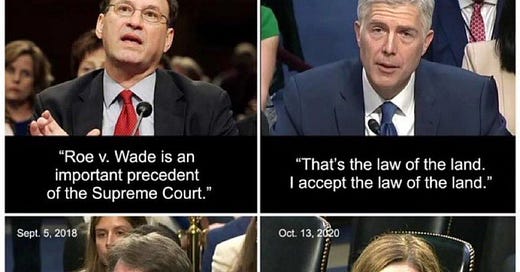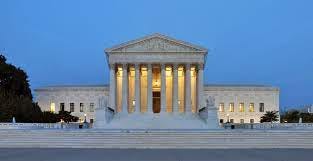Issue #73 OpEd June 27, 2022 (About 4 minutes reading time)
What Can Democrats Do?
I’m going to be discussing this from now to November. Historically, the party in power loses seats in the midterms, but it doesn’t have to be that way. This year, our very democracy, as well as our rights and provisions such as Medicare, Medicaid, Social Security, the environment, and several others, are on the Republican chopping block.
We have to start now to work to keep and expand our House Majority and keep and especially expand our majority in the Senate.
Two of the present Democratic Senators align more with Republicans than with Democrats, so the present “majority” is not the reality. The Republicans need to gain only one seat to retake the Senate majority.
We know that the Republicans will do everything they can to throw out or otherwise not count Democratic votes in November. It is all about power for them, not policies that actually help the American people.
We cannot allow ourselves to be subjected to the radical right-wing minority.
If we hold onto the Democratic Senators we have now, and then elect just two more Democratic Senators, we will have enough to get rid of the filibuster and codify Roe and get a lot of other things done that Biden promised. Getting rid of the filibuster takes just a simple majority in the Senate.
The opportunity to hold or expand Democratic Senate Seats are in Wisconsin, Pennsylvania, Florida, Colorado, Alabama, Missouri, Arizona, North Carolina, Oklahoma, Ohio, Pennsylvania, Georgia, and Vermont. There will be 34 Senate elections this year: 1/3 of the current Senate is up for election every two years for six-year terms.
We talked about the recent SCOTUS decisions in our recent podcast episode:
In just the past week alone, the Supreme Court of the United States (“SCOTUS”) announced rulings that:
Made the 56-year-old Miranda Rights optional.
Struck down a 100-year-old New York law that restricted open carry outside one’s home.
Stated that Maine could let parents use vouchers of funds for public schools to pay for private religious education, which is against the First Amendment religious establishment.
Struck down the 49-year-old decision that gave women the right to seek a safe and legal abortion.
On Thursday, the SCOTUS said that the states were not “competent enough” to regulate gun control, so the Federal government has to do it.
On Friday, the very next day, the SCOTUS said that the Federal government can’t allow full abortion rights and that each State must decide for itself.
The SCOTUS did the same thing in 2013 when it gutted the 1965 Voting Rights Act that ensured that all states must protect the right to vote; that “responsibility” was sent back to the Republican-led states, many of whom have since decimated voting rights for the people who they think will not vote for them.
Republicans in the Senate represent only 22% of the population, yet we find ourselves being ruled by a radical right minority. That is not what the Founders wanted.
Either the States make 50 different laws or the Federal Government makes one law for all. That’s what Abraham Lincoln thought about the fight between slave states and free states.
In the spring of 1858, during a Republican convention where he accepted the nomination for U.S. Senator, Abraham Lincoln voiced these words in an evening speech:
"A house divided against itself, cannot stand."
I believe this government cannot endure permanently half slave and half free.
I do not expect the Union to be dissolved — I do not expect the house to fall — but I do expect it will cease to be divided.
It will become all one thing or all the other.
Either the opponents of slavery will arrest the further spread of it, and place it where the public mind shall rest in the belief that it is in the course of ultimate extinction; or its advocates will push it forward, till it shall become lawful in all the States, old as well as new — North as well as South.”
As usual, historian Professor Heather Cox Richardson wrote an excellent article relating the 1850s to today’s events:
Lincoln was responding to his Democratic opponent, the incumbent Stephen A. Douglas, who was an advocate for each state deciding whether it would be a slave state or a free state, a policy now known as “States’ Rights.” Lincoln also had in mind the 1857 Dred Scott Supreme Court decision that concluded that Black people were not and never could be citizens of the United States. Chief Justice Roger Taney, an extremely racist former slave-holder and the brother-in-law of the equally racist writer of the national anthem, Francis Scott Key, stated that African Americans were inferior and therefore had “no rights that the white man was bound to respect,” and should lawfully be reduced to slavery for their own benefit.
The Dred Scott decision has been called the worst SCOTUS decision in history. The decision so angered the Northern Republicans that it helped Abraham Lincoln to win the presidency in 1860. Some say that the decision, and especially the philosophy of “States’ Rights” led to the Civil War.
A quick reminder that yesterday’s Republicans are today’s Democrats, and yesterday’s Democrats are today’s Republicans, as far as many policies and overall beliefs are concerned.
The 14th Amendment
In 1866, right after the end of the Civil War, Congress passed the 14th Amendment, and it was ratified in 1868. One of the primary elements of the 14th Amendment was to give full citizenship to formerly enslaved Black men (women of any race were not given citizenship until the 19th Amendment was ratified in 1920).
But the 14th Amendment also protected the right to privacy through “due process.” Privacy was not mentioned in the original Constitution. Abortion was not mentioned in the original Constitution. Women weren’t mentioned in the original Constitution. No one had rights in the original Constitution except white male landowners.
That’s why we have amendments.
Roe v Wade was decided on the privacy philosophy, as were Obergefell v Hodges (same-sex marriage) and Loving v Virginia (interracial marriage). The 14th Amendment also states that ALL people have equal rights, and that means LGBTQ people.
Associate Justice Clarence Thomas, in his agreement with this decision, specifically said that the Court, now that the SCOTUS has effectively thrown out the right to privacy and stare decisis (legal precedents), believes that legal precedents like Roe don’t apply. He wants the SCOTUS to now “re-decide” the rights to same-sex marriage, contraception, and bedroom privacy, all of which were decided by the 14th Amendment right to privacy provision. Interestingly, Thomas did not mention Loving, which affects his own interracial marriage.
Five of the current nine Supreme Court Justices were appointed by presidents who did not win the popular vote.
Four of the current Supreme Court Justices lied during their confirmation hearings when they said—under oath—that Roe was settled law.
The Roe decision was the most consequential ruling announced last week, but other decisions—last week, in the past months, and upcoming—are also decimating ALL of our rights and freedoms. We are being ruled by the radical right-wing minority.







